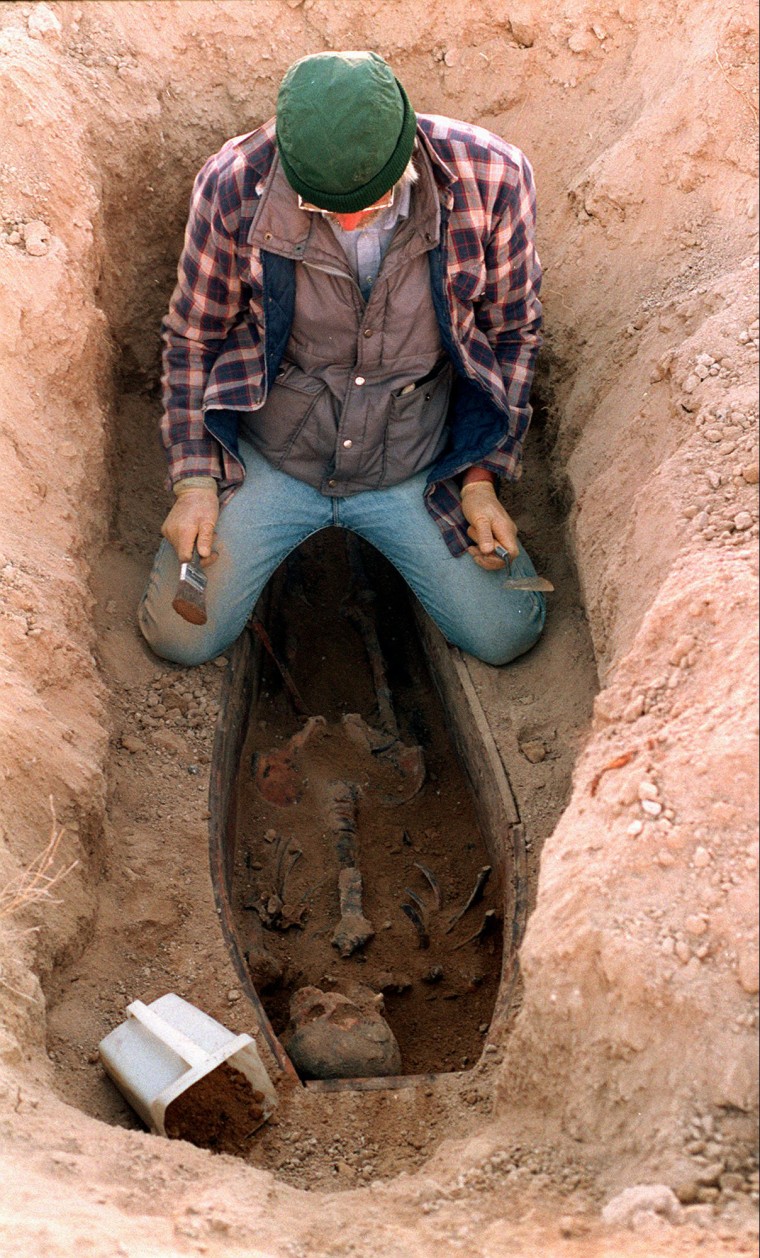The remains of 13 Chinese men who came to Nevada in the 1800s were reburied Tuesday after being exhumed more than two decades ago for archaeological study.
It’s the end of more than 21 years of waiting for Lijuchin “Lee” Chin, a restaurant owner in Carlin, Nevada, who has been involved in the case since a property owner in the city found the remains in his backyard in November 1996.

Chin’s customers came to her then and said she had to go see what was happening after the remains were found. When she made it to the scene, archaeologists were already investigating, Chin recalled.
It turned out that the property was a forgotten Chinese cemetery, according to Professor Emerita Sue Fawn Chung of the University of Nevada, Las Vegas, who assisted in researching the identities of the men. The 13 were a small fraction of the thousands of Chinese immigrants who migrated to the American West to work in gold mines starting in 1848. Some settled in Carlin after the gold rush.
“In 1868 the Central Pacific Railroad went through Carlin and some of the Chinese found a place in the desert with a natural spring to grow produce,” Chung said.
While there were many Chinese in the city during the late 1800s, according to Margaret Johnston, a member of the city council, very few remain today in the city of about 2,400. The 2010 U.S. Census counted just three people of Chinese descent in the city that year.
While the discovery was exciting for the archaeologists, Chin wanted to make sure the bodies were handled properly.
“I told the professor at the site that when you finish all this research, please rebury them and they said 'Oh yeah, we will do it,'” Chin said.
I’ve waited for this day too long. I can’t believe it. I am so happy that they can finally come home. This is their home.
Johnston, a member of the Carlin city council, said the research project was initially only supposed to take 6 months to a year.
The remains were originally sent to the Nevada State Museum, according to The Associated Press and Elko Daily Free Press, and were eventually transferred to the University of Nevada, Las Vegas anthropology department.
They were studied by scientists from the Smithsonian, a group from National Geographic, and the University of Nevada, Las Vegas graduate students, according to Chung.
The research led to the detailing of Chinese burial practices: The caskets contained personal items like tobacco pipes, opium pipes, eyeglasses, and coins to be used in the afterlife, according to Chung.
“Research takes a long time and once the studies were done, UNLV Anthropology Department had to have Carlin agree to take back the remains for reburial in the Carlin public cemetery as part of the original agreement,” she said.
Chin said she reached out to Johnston about four or five months ago to help retrieve the remains.
“We just did everything right. We talked to the funeral home. We found out what kind of permitting we needed,” Johnston said. “It was a long tedious process because people don’t do that every day.”
Local residents helped prepare the remains for reburial, building and painting 13 caskets, Chin said. More than $600 worth of materials were donated by a local Home Depot and a local resident, she added.
Chin and her husband organized the ceremony, incorporating Chinese burial traditions, including incense burning and fresh flower arrangements as well as a meal for the attendees.
“I’ve waited for this day too long. I can’t believe it. I am so happy that they can finally come home. This is their home,” Chin said. “I’m not going to let anybody touch them again.”
Follow NBC Asian America on Facebook, Twitter, Instagram and Tumblr.
